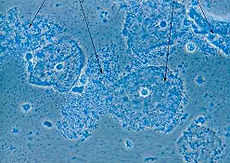Bacterial vaginosis (BV) is a really common vaginal infection -about one in three women will get BV at some point in their lives, and about 23 percent of pregnant women (and 19 percent of women who are not pregnant) have it at any given time. Treating it as soon as you feel itchy will keep it from having any adverse effect on your pregnancy, but untreated BV has been linked to problems conceiving, ectopic pregnancy, early pregnancy loss and pre-term labor, so it’s important to treat the infection before you try to conceive, or as soon as you experience any symptoms: vaginal itching and sometimes an unusual odor, pain and/or a burning sensation.
Bacterial vaginosis is caused by an imbalance of bacteria, when the “bad” bacteria outgrows the “good.” It’s not sexually transmitted, though having multiple sex partners does appear to increase the risk.
BV (and yeast infections) are more common in pregnant women, probably because pregnancy raises your body temperature and increases your discharge, and this makes for a good environment for bacteria to flourish.
But while yeast infections are caused by a yeast organism, BV is caused by a group of bacteria, and using yeast infection treatments to treat BV will make the BV infection even worse. The infection trichomonias can also sometimes have symptoms similar to a yeast infection or BV. So during pregnancy you should always see a health care provider to get a diagnosis before you try to treat any burning or itching symptoms, even if you’ve had a yeast infection before and think you have one. Your health care provider will be able to tell exactly what is causing your symptoms by looking at a swab under a microscope.
If you have BV, there are a couple of different medications used to treat it. The drug of choice during pregnancy is metronidazole, also known as Flagyl, which is a pill that you take orally. It’s a category “B” drug, which means that while the use of the drug hasn’t been studied during pregnancy, no adverse affects have been reported either. You may also be given clindamycin, a topical cream that will help soothe the itch. Tinidazole, a common treatment for BV, shouldn’t be used during pregnancy.
During and after treatment (and really all throughout pregnancy) it’ll help to consume at least two servings of pro-biotic foods a day, such as yogurt with active cultures, cold drinks with kombucha, salad dressing with miso, or any kind of fermented food, like kimchi. Note that temperatures above 115F (46C) will kill healthy bacteria in pro-biotic foods, so hot kombucha tea or miso soup won’t have an effect.


